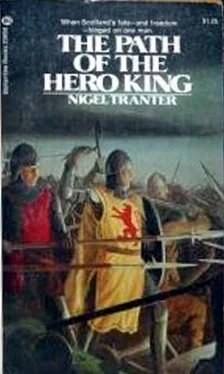Anxious about this vast pall of smoke being seen and interpreted from the Tyne valley five miles to the southeast, even above the hills between, the King ordered the trumpets to blow for disengagement and assembly. They rode southwards, out of the reeking, ravaged valley, almost an hour earlier than hoped for.
Now their route lay through the defile of the Tipalt Burn described by Randolph. The actual narrows of this comprised only the central mile or two; and well before this was reached the invaders found themselves having to plough through an unhappy flood of returning refugees streaming back northwards in renewed panic. Randolphs holding operation had served its purpose. When Bruce in due course picked up the little company strongly entrenched in the gullet of the pass, it was to be assured that no single messenger or escapee had got through to warn the Vale of Tyne-by this route, at least.
They were trotting through the final mile of the defile when, rounding a bend of its narrow floor beside the brawling burn, they came face to face with a mounted party of perhaps fifty, riding in the opposite direction. Bruce had not put out his usual scouting advance-guard on this occasion, no serious challenge being looked for, and as such would only be apt to offer prior intimation of something unusual happening. So this confrontation was a surprise to both sides.
However equal the surprise, reaction of course was quite otherwise,
with so few facing so many-even though they would not see a quarter of
them. Besides, these were not knights and men-at arms, but looked like
farmers and burghers on horseback. Almostcertainly they represented a
posse of Haltwhistle citizens hurrying to see what the great bank of smoke signified. At any rate, they behaved with commendable unanimity and expedition now, disciplined or not. With a great scrabbling, rearing and sidling of struggling mounts, they pulled round and went plunging off whence they had come, each jostling to be foremost After them, Jamie! Bruce commanded.
With our first ten files. Quickly! Head them off from the town. They must not warn.
Almost before the words were out, Douglas was spurring ahead, yelling to the front ranks of their company to follow. Pushing past the Kings group, all but unseating some of them indeed, eager riders galloped in pursuit Bruce increased the pace of the entire host to a canter.
When they emerged, almost at right angles, into the open green vale,
wider than that of Irthing, it was to see the better-mounted Scots
dispersing the fleeing burghers left and right, like wolves amongst
sheep, far ahead The town of Haltwhistle showed grey beyond, its roofs
and spires catching the glow of the sinking
Ignoring the nearby castle of Blenkinsopp meantime. Bruce led his host directly and at fullest speed for the town, hooves drumming an earthshaking, terrifying first intimation.
If many of the Scots were grievously disappointed at the lack of opposition they met, at the sheer anticlimax of the whole affair, the King was not This was what he had planned and hoped for. By the time that they reached the first houses, the streets were quite deserted, no single face peered from door or window-although a few hones still stood tethered here and there. The host swept clatteringly through the town without meeting more than yelping dogs, squealing pigs and squawking poultry. It was not a large place, though larger than Gillsland; but it had a big and important church in its centre, with collegiate buildings attached. This church was a major reason for Bruces presence herefor, oddly enough, it belonged to the See of Aberdeen, with considerable property in the town and surrounding country, a relic of happier days when the English were friends, and thus had been almost a detached part of Scotland. Holy Church was powerful and international, and Haltwhistle Church represented a useful excuse for the Scots incursion when the inevitable Papal fulminations began-for of course the Bishop of Aberdeen had been deprived of its due revenues for many a long year. Bruce, therefore, turned back for this church, to make it his base and headquarters, sending for the Vicar. Meanwhile he placed contingents of his men to dominate every street, lane and alley, with strong pickets to patrol the entire perimeter. But he gave strict instructions that there was to be no assault, pillage or burning here.
The terrified Vicar, when he was routed out of hiding and brought before the King, was assured that since Haltwhistle was as good as a Scots town, its people need fear nothing-so long as they cooperated and behaved discreetly. He was required to furnish a list of all Aberdeen property in the area; and then to go, under escort, and bring the principal citizens to Bruce, for their instructions.
So in due course these alarmed worthies were assembled to learn their fate-and could scarcely believe their ears. Haltwhistle would not be burned. Nobody would be hanged, beaten, ravished or otherwise molested. No hostages would be taken. The town would be treated as would a Scots town. The King of Scots and his force would occupy it for a few days-but they would pay for their keep and lodgings. Obedience and cooperation, that was all that was required. That, and the collection of the overdue and accumulated revenues for the Bishop of Aberdeen, which the King would take back to Scotland, as was suitable and lawful. For the rest, peace and goodwill. Only, the least hint of treachery, of attempts to communicate with other towns or areas, and there would be immediate and dire punishment, with no mercy shown. Was that understood?
There were no arguments, no questions.
That night the King, and most of his people, slept warm and comfortable, with minor detachments out guarding the approaches to the town, by the Tipalt Burn and both reaches of Tyne, while others kept careful watch on the small local castles. Bruce had chosen carefully in this, as in all else; Haltwhistle, placed as it was, was as good as a citadel for them.
Sunrise saw the Scots trotting in disciplined ranks down the broadening Tyne valley, leaving a small garrison, under Randolph, in Haltwhistle, with scouts carefully placed all around. The villages of Melkridge, Henshaw, Bardon Mill and Chesterwood went up in flames behind them, and by noon they were at the small town of Haydon Bridge, important strategically. There was a modest castle here, to guard the vital bridge over Tyne, but the word of the Scots advance had preceded them down the river and they found the castle abandoned, and town almost so.
With the provisions of the whole missing community to sustain them, the
invaders made their midday meal here. They moved on again in two
sections, north and south of the river, under Douglas and the King
respectively. They were seldom out of sight.
Newborough, Fourstones, Elrington and Wharmley fell to them, with many farms, mills and lesser places, without a sword drawn.
All the vale behind was now hidden under a pall of smoke. The large town of Hexham, with its great and famous Priory, lay ahead, where North Tyne came in to join South.
Bruce had drawn up his contingent at West Boat, where there was a ferry by which Douglas came across to join him and receive orders, when scouts came to inform that a party under a white flag was riding out from Hexham. The King ordered the newcomers to be brought into his presence.
The white-flag party consisted of the magistrates and chief citizens of the town, looking very alarmed; and the Prior of Hexham looking magnificent, with even a silken canopy held over his head by four mounted acolytes on milk-white jennets, the stuff richly embroidered with a gold saltire on azure. Hexham had been a bishopric once, and its foundation in 674 by Saint Wilfred made it one of the most ancient and venerable fanes in all England. Undoubtedly the present incumbent was not disposed to forget it. Ignoring the genuflecting magistrates, Bruce addressed himself to the still-mounted prelate.
Читать дальше












